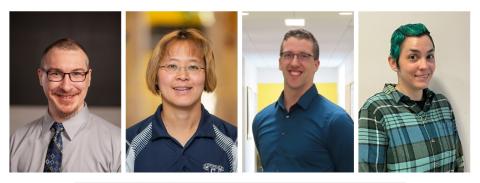Biochemistry M.S. students enroll in courses, participate in seminars, and engage in research. The program can be completed in 15-21 months and requires 30 credit hours (for students following the 2024-25 General Bulletin) of which at least 18 hours must be letter graded. (36 credit hours are required for students following a General Bulletin earlier than 2024-25.)
Please see below for the lists of required courses and approved electives courses, and the requirements for the five optional concentrations. Highlights of the M.S. curriculum are several laboratory courses that provide experimental expertise valuable for careers in both industry and academia.
(Biochemistry faculty lab instructors Drs Arvidson, Wang, and Howell, and teaching laboratory manager Leslie Severt)
While research is not required, most students choose to participate in experimental biomedical research for course credit. Students work with faculty mentors in the Biochemistry program. They can also choose from over 200 faculty mentors at CWRU School of Medicine and our affiliated hospitals. This opportunity is excellent preparation for students who wish to pursue a PhD degree; strong students may be permitted to transfer to our PhD program.
The degree can be completed with either full- or part-time study. Part-time study is convenient for research assistants in CWRU biomedical science laboratories.
Required Courses
| BIOC 407 | Introduction to Biochemistry: From Molecules to Medicine | 4 |
| BIOC 408 | Molecular Biology | 4 |
| BIOC 500 | Biotechnology Laboratory: Molecular Biology Basics | 1 |
| BIOC 501 | Biochemical and Cellular Techniques for Biotechnology | 3 |
|
BIOC 502A or BIOC 502B or BIOC 503 |
Biotechnology Laboratory: Molecular Biology and Biochemical Techniques or Biotechnology Laboratory: Eukaryotic Molecular and Cellular Biology or Biotechnology Laboratory: CRISPR |
2 |
| EXAM 600 | Master's Comprehensive Exam | 1 |
| Electives |
(Maximum of 9 credits of BIOC 601) |
*15 |
*15 credit hours of electives for students following the 2024-25 General Bulletin; 21 credit hours for earlier General Bulletins
Optional Concentrations
To help guide students in selecting their elective courses, five optional concentrations are available. These concentrations leave room in student schedules for research and additional electives.
Cancer Biology
| BIOC 450 | Molecular Basis of Cancer | 3 |
| BIOC 453 | Biochemical Pathways in Cancer Therapeutics | 3 |
| BIOC 460 | Advanced Technologies for Cancer Research |
3 |
Experimental Biotechnology
| BIOC 460 | Advanced Technologies for Cancer Research | 3 |
| BIOC 500 | Biotechnology Laboratory: Molecular Biology Basics | 1 |
| BIOC 511 | Practice and Professionalism in Biotechnology | 1 |
|
Two of: BIOC 502A or BIOC 502B or BIOC 503 |
Biotechnology Laboratory: Molecular Biology and Biochemical Techniques Biotechnology Laboratory: Eukaryotic Molecular and Cellular Biology Biotechnology Laboratory: CRISPR |
4
|
Infectious Disease
| BIOC 410 | Microbial Physiology and Therapeutic Opportunities | 3 |
| BIOC 411 | Antimicrobial Therapies and Resistance | 3 |
| BIOC 434 | Structural and Computational Biology | 3 |
Metabolism
| BIOC 412 | Proteins and Enzymes | 3 |
|
Two of: BIOC 415 or BIOC 444 or BIOC 445 |
Lipids, Membranes, and Membrane Proteins Molecular Endocrinology Metabolic Regulation, Dysregulation, and Disease |
6
|
Molecular Structure and Function
| BIOC 412 | Proteins and Enzymes | 3 |
| BIOC 415 | Lipids, Membranes, and Membrane Proteins | 3 |
| BIOC 434 | Structural and Computational Biology | 3 |


